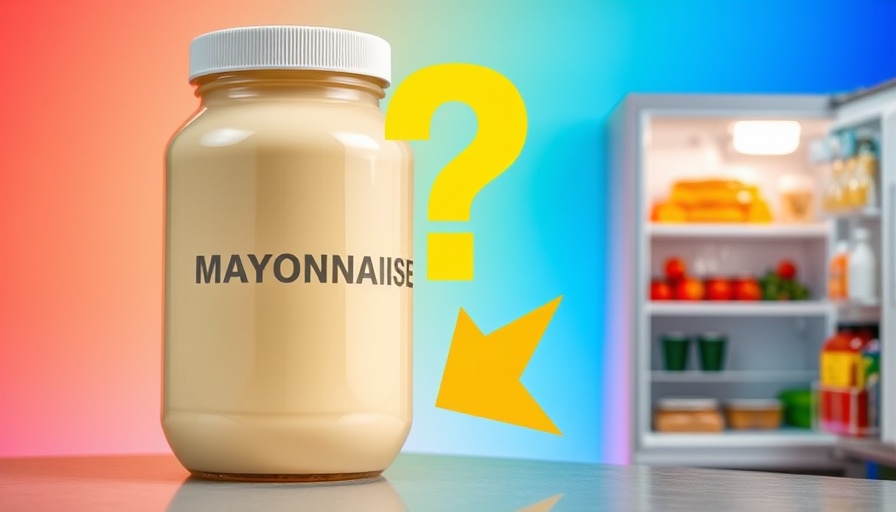
The Essential Guide to Storing Mayonnaise Safely
As parents, we always strive to keep our families healthy and safe, including how we handle food in our kitchens. Mayonnaise is a versatile condiment found in many households. It enhances the flavor of sandwiches and salads, yet its storage is often overlooked. So, does mayo need to be refrigerated? The short answer is yes, but let’s break this down.
What Happens When Mayo Goes Bad?
Understanding mayonnaise’s ingredients is crucial for grasping why proper storage matters. Commercial mayonnaise typically contains pasteurized eggs and preservatives, making it safe to keep at room temperature until opened. However, once opened, the game changes. Refrigeration is vital to slow spoilage and prevent bacterial growth.
If you leave opened mayo out at room temperature, its freshness deteriorates quickly. We recommend following proper guidelines: store it in a cool place once it’s opened, and it should last about 2–3 months in the refrigerator for the best quality. Keep an eye on it; signs of spoilage include changes in color, texture, or an off smell.
Homemade vs. Store-Bought Mayonnaise: Different Rules Apply
Many families enjoy making homemade mayonnaise, and while it may taste better than store-bought, it requires stricter adherence to storage rules. Homemade mayo, lacking preservatives, should be refrigerated immediately after preparation. The key ingredient here is raw egg yolks, which are perishable and can lead to foodborne illnesses if not stored correctly. Always refrigerate homemade mayo to keep it safe for your family.
How Long Can You Keep Different Types of Mayo?
Here’s a breakdown to clarify how long various types of mayonnaise last:
- Unopened Store-Bought Mayo: Can stay in a pantry for up to a year.
- Opened Store-Bought Mayo (Refrigerated): Best quality lasts 2–3 months.
- Opened Store-Bought Mayo (Room Temperature): Maximum of one month, but flavor diminishes significantly.
- Homemade Mayo: Should be used within one week when refrigerated.
These timelines are general estimates, but it's always wise to check the manufacturer's guidelines and the date on the container.
Refrigeration and Food Safety Tips
Refrigerating mayonnaise isn't just a preference—it has real implications for food safety. Here are some actionable insights for keeping your mayo in top shape:
- Always close the lid tightly after use to minimize airflow.
- Keep mayo at the back of the refrigerator, where it’s coldest.
- Avoid leaving mayo out during meals; instead, portion out what you need.
Implementing these practices can help you maintain the freshness of your condiment and safeguard food safety for your family's meals.
Common Myths about Mayo Storage
Even with basic knowledge, some myths persist regarding mayonnaise. One common misconception is that all mayonnaise can survive outside the fridge once opened. Remember, even commercial mayos can spoil quickly once exposed to room temperatures!
Another myth is that adding more vinegar will prolong the shelf life of homemade mayo. While vinegar acts as a preservative, it isn't a foolproof solution, and the raw eggs still pose a risk if kept out too long.
Practical Advice for Busy Parents
Busy schedules make it challenging to maintain a clutter-free, fully stocked fridge. Here’s how to make managing mayo easier:
- Incorporate mayo-based dishes: Use it in salads, dressings, or dips to ensure it doesn’t linger too long in the fridge.
- Use smaller containers: Repurpose small jars to store and use homemade mayo in reasonable quantities.
- Teach your kids about food safety: Involve them in food storage discussions to create lasting healthy habits.
Educational moments in the kitchen not only help reinforce food safety but also encourage kids to make healthier choices.
Conclusion: The Mayo Maintenance Challenge
Managing mayonnaise in your kitchen is essential for food safety and preserving flavor. Whether it's commercial or homemade, understanding when to refrigerate and how long it lasts can save your family from health risks and enhance mealtime experiences.
Join the conversation! Share your mayo storage hacks or favorite recipes utilizing this beloved condiment in our healthy family focus. Let's keep our kitchens safe and delicious together!
 Add Row
Add Row  Add
Add 




 Add Row
Add Row  Add
Add 

Write A Comment